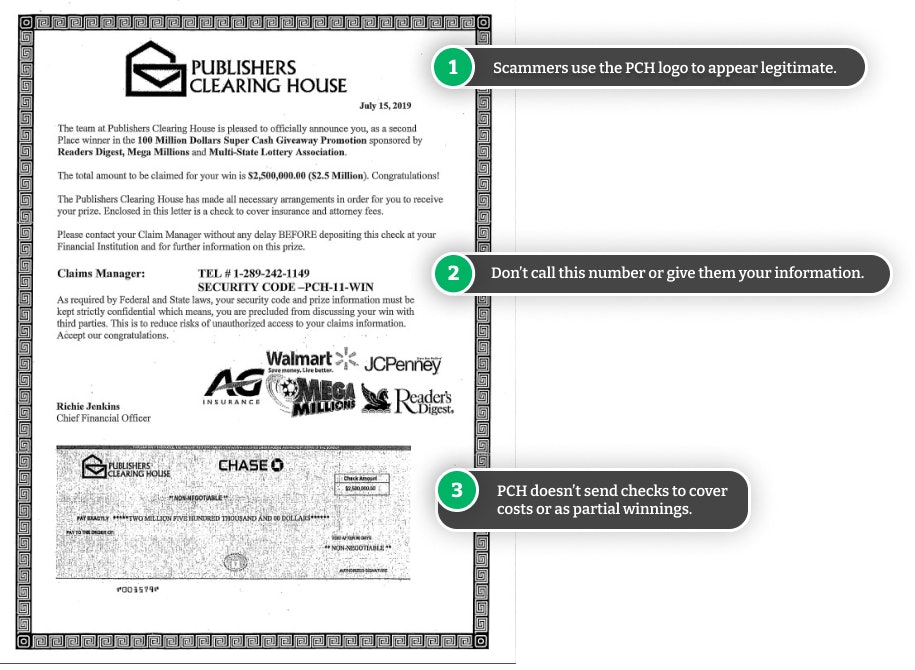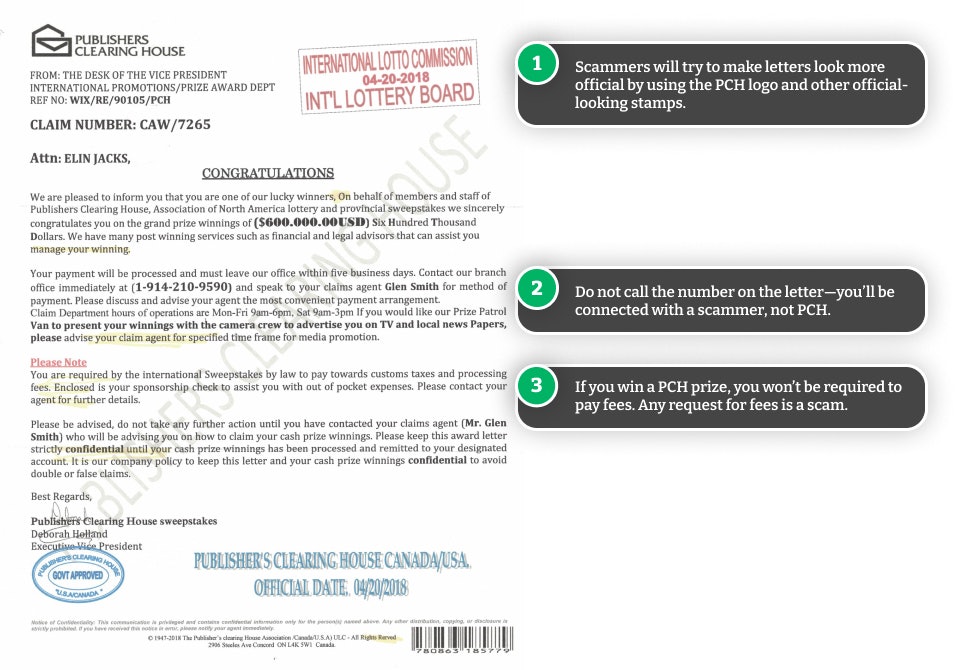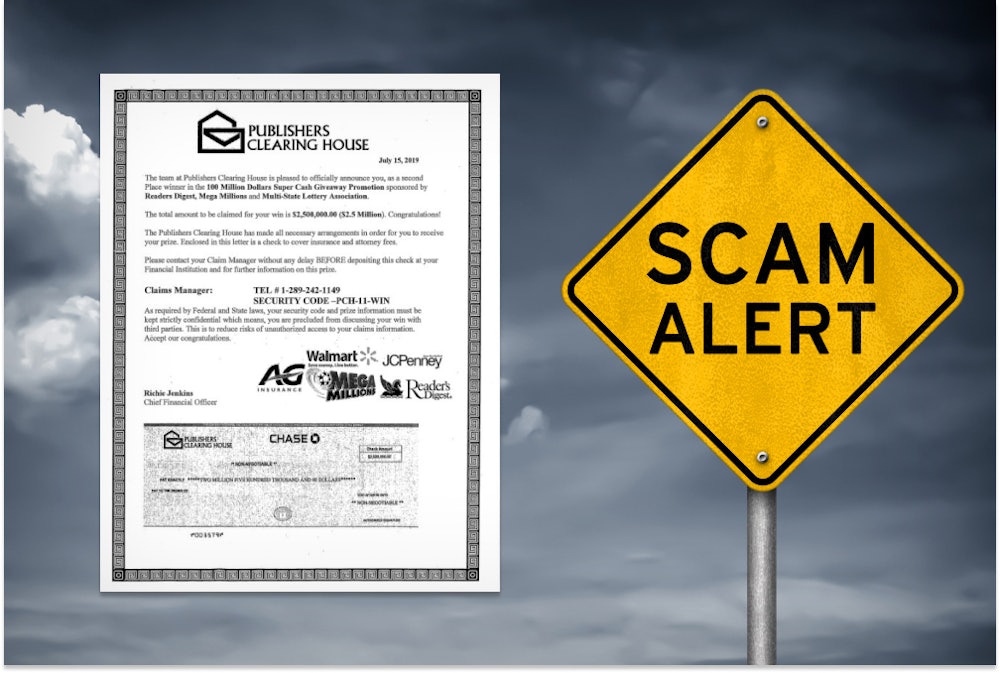- What is Publishers Clearing House Scam Mail?
- Red Flags of Publishers Clearing House Scam Mail
- How to Beat Fake PCH Mail Scams
- What To Do If You Fall for This Scam
- Frequently Asked Questions
Fake Publishers Clearing House (PCH) mail has been sent around for years, tricking people into thinking they’ve won a sweepstakes prize. Although there have been different versions of this scam circulating, they all have the same goal—to steal your money and information. Here’s why fraudsters are sending Publishers Clearing House scam mail and how you can beat this scam.

- Financial Fraud Protection
- Identity Theft Protection
- Family Protection & VPN
What is Publishers Clearing House Scam Mail?
PCH scam mail is essentially fake letters that fraudsters send to people across the U.S. They look completely genuine for those unaware of this scam, including the PCH logo and signatures from (fake) PCH representatives.
Example PCH Scam MailThe team at Publishers Clearing House is pleased to officially announce you, as a secon Place winner in the 100 Million Dollars Super Cash Giveaway Promotion sponsored by Readers Digest, Mega Millions and Multi-State Lottery Association.
The total amount to be claimed for your win is $2,500,000.00 ($2.5 Million). Congratulations!
The Publishers Clearing House has made all necessary arrangements in order for you to receive your prize. Enclosed in this letter is a check to cover insurance and attorney fees.
Please contact your Claim Manager without any delay BEFORE depositing this check at your Financial Institution and for further information on this prize.
Claims Manager: TEL # 1-493-332-223
As required by Federal and State laws, your security code and prize information must be kept strictly confidential which means, you are precluded from discussing your win with third parties. This is to reduce risks of unauthorized access to your claims information. Accept our congratulations.
Here’s how the scam works.
You Receive a Letter
You receive a letter in the mail that looks like it’s from Publishers Clearing House. There are a few different versions of this letter circulating, including:
- A letter congratulating you on your sweepstakes win, including a phone number to call to claim your prize.
- A letter that includes a check as partial payment of your winnings and asks you to call a claim manager.
- A letter claiming you’ve won a major prize and must contact a PCH representative by the deadline, or you’ll lose your winnings.


You Call the Number Given
Thinking you’ve won a sweepstakes prize, you follow the instructions in the letter and call the phone number. The person you talk to may ask for:
- Your personal information, such as your:
- Full name
- Address
- Date of birth
- Social Security number (SSN)
- Payment, to cover things like attorney and processing fees and taxes
- Your bank account or credit card details
The scammer on the other end of the line will try to convince you they need all this information and payment to process the entirety of your winnings, whether it be $10,000 or $10 million.
Publishers Clearing House only notifies you by mail if you've won less than $10,000. If you've won more than that (i.e., a major prize), you'll be notified in person by the famous Prize Patrol.
PCH sends mail notifications via overnight express carrier (never in the regular post).
You Give Your Information/Payment to the Scammer
Feeling excited that you’re about to get the prize of your life, you give the scammer what they ask for, whether it be your sensitive information, payment, or both. The scammer will then continue with the lie, telling you that your winnings will be coming in some form, and you’ll just need to wait.
You wait…and wait, but no money comes your way. Then, if you try to call the phone number again, they will tell you to keep waiting, or the number won’t even work anymore.
You Lose Your Money, and Your Identity is Stolen
Eventually, you’ll realize you’ve been scammed. Unfortunately, if you gave money to the scammer, it’s unlikely that you’ll be able to get it back since you sent it to them via an untraceable and unprotected method.
With your information, the scammer can now pretend to be you and use your identity to apply for loans, credit cards, commit fraud, and more.
Giving your information to someone may not seem like a big deal, but identity theft can take years to recover from, causing you serious financial problems and issues with the IRS.
Red Flags of Publishers Clearing House Scam Mail
There are several things to look for when you receive mail from Publishers Clearing House. First, if you didn’t enter any sweepstake, then it’s a scam—why would you be winning a prize if you didn’t even enter?
Also, look out for the following red flags in a PCH letter:
- A letter claiming you’ve won sent via regular post (genuine letters will be sent via overnight express carrier).
- Misspellings or incorrect grammar.
- A letter claiming you've won more than $10,000 (PCH notifies major prize winners in person).
- Any requirements to pay fees.
- A request for payment (usually by prepaid gift card, wire transfer).
- An enclosed check. It’s common for scam letters to say the check is:
- To help you cover insurance/attorney fees.
- To help you pay for processing fees and other out-of-pocket expenses.
- A partial payment of your winnings.
- A request to refund money to them after cashing in a check.
- A requirement to call a specific PCH agent or another representative to receive your winnings.
- Usually, the letter will say you need to let the agent know how you’d like to receive your payment.
- A requirement that you keep your winning a secret.
- A request for payment information (e.g., credit card information, gift cards, etc.).
As this scam has been active for several years, it has transformed, including elements that make it appear to be legitimate and from the real Publishers Clearing House. However, don’t be fooled—don’t fall for these tricks:
- The PCH logo: Just because a letter has the legit PCH logo doesn’t make it real. It’s easy to get the logo online and print it in a letter.
- A legitimacy stamp: Most fake PCH letters have a “GOVT APPROVED” stamp to make them look genuine. This does not mean anything.
- Sign off from a PCH representative: Usually, these will be from someone from high up, such as the Executive Vice President or the Chief Financial Officer. Genuine PCH letters are signed, but fraudsters will also fake signatures.
How to Beat Fake PCH Mail Scams
If you receive a letter that contains any of the scam elements above:
- Do NOT call the phone number listed.
- Do NOT respond in any way.
- Do NOT give the representatives any of your information or payment.
- Do NOT deposit the check (it will not clear).
You should report the PCH scam mail to Publishers Clearing House directly. You’ll need to provide information, such as:
- The date you received the letter.
- What the scammer requested.
- What names they use on the letter.
- What phone numbers they give you.
- What address they put on the letter.
- How much money they say you've won.
Publishers Clearing House
It's important to verify links and contact details to beat imposters.
What To Do If You Fall for This Scam
If you fall for this scam and send money to the fraudsters, report it to Publishers Clearing House. They may contact you directly to try and rectify the situation and help you get your money back, but in some cases, it’s already too late.
You should take the following steps to protect your identity and also to try and get your money back:
- Alert your credit card company if you gave your information to the scammer (they will cancel your card and issue you a new one). Also, dispute any fraudulent transactions that have already been made.
- If you bought prepaid gift cards, alert the company you purchased them from and see if you can deactivate them.
- If you made a wire transfer, call your bank or the wiring company as soon as possible to reverse the transaction. Note that once the recipient has received the money, you’ll be unable to reverse the transaction.
- If you gave the scammer your Social Security number (SSN):
- Place a fraud alert on your credit report.
OR - Freeze your credit completely.
- Place a fraud alert on your credit report.
- Be on alert for other scams that may come your way, including via email, mail, phone call, or even via social media.
- Report the scam to Publishers Clearing House and the authorities.


Comments